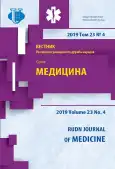Immunohistochemical Study of Tumor Cells Proliferative Activity at Different Graduations of Prostate Cancer
- Authors: Kudryavtsev G.Y.1, Kudryavtseva L.V.1, Mikhaleva L.M.2, Babichenko I.I.1
-
Affiliations:
- Peoples’ Friendship University of Russia (RUDN University)
- Research institute of human morphology
- Issue: Vol 23, No 4 (2019)
- Pages: 364-372
- Section: ONCOLOGY
- URL: https://journal-vniispk.ru/2313-0245/article/view/345225
- DOI: https://doi.org/10.22363/2313-0245-2019-23-4-364-372
- ID: 345225
Cite item
Full Text
Abstract
Prostate cancer is one of the leading causes of men death in developed countries. Modern diagnostic methods, including a puncture biopsy of the prostate gland, make it possible to verify oncology in the early stages, however, routine studies do not always allow to predict the course of the disease and outcome. The aim of our study was to analyze the clinical, morphological and immunohistochemical features of the proliferative activity of adenocarcinoma cells using the Ki-67 marker, to compare the degree of proliferative activity in tumors of various degrees of malignancy (according to Gleason’s classification), as well as to compare this indicator with the clinical stage of the disease, the level of prostate-specific antigen in the blood, the size of the prostate gland. Materials and Methods: On the basis of the City Clinical Hospital No. 31 and the Veteran Hospital No. 2, paraffin blocks with material obtained as a result of prostate biopsy, transurethral resection, and radical prostatectomy were selected. A morphological and immunohistochemical study of the material with the Ki-67 marker and a quantitative assessment of the degree of proliferative activity were carried out. Data were analyzed using the STATISTICA 10.0 program using estimates of the normality of the data distribution according to the Shapiro-Wilk W-test, the significance of differences was estimated using the Mann-Whitney U-test, and correlation relationships using Spearman’s correlation coefficient. Results: Statistically significant differences in the degree of proliferative activity in groups differing in the degree of differentiation were revealed. A statistically significant direct correlation of moderate severity was revealed when comparing proliferative activity with the degree of differentiation according to the Gleason system (rs = 0.523) and the clinical stage of the disease (rs = 0.646). No statistically significant correlation was found between indicators such as prostate-specific antigen level, age, prostate volume, and proliferative activity index. Conclusion: taking into account the proliferative activity index in addition to clinical and morphological studies helps to diagnose and subsequently predict the course of prostate cancer.
About the authors
G. Y. Kudryavtsev
Peoples’ Friendship University of Russia (RUDN University)
Author for correspondence.
Email: kgosha@mail.ru
Moscow, Russian Federation
L. V. Kudryavtseva
Peoples’ Friendship University of Russia (RUDN University)
Email: kgosha@mail.ru
Moscow, Russian Federation
L. M. Mikhaleva
Research institute of human morphology
Email: kgosha@mail.ru
Moscow, Russian Federation
I. I. Babichenko
Peoples’ Friendship University of Russia (RUDN University)
Email: kgosha@mail.ru
Moscow, Russian Federation
References
- Cooperberg M, Carroll PR. Trends in management for patients with localized prostate cancer, 1990-2013. JAMA. 2015;314(1): 80-82.
- Matoso A, Epstein JI. Grading of prostate cancer: Past, present, and future. Curr Urol Rep. 2016;17: 576-8.
- Gordetsky J, Epstein J. Grading of prostatic adenocarcinoma: current state and prognostic implications. Diagn Pathol. 2016;11: 1-8.
- Léon P, Cancel-Tassin G, Drouin S. Comparison of cell cycle progression score with two immunohistochemical markers (PTEN and Ki-67) for predicting outcome in prostate cancer after radical prostatectomy. World J Urol. 2018;36: 1495-1500.
- Bratt O, Folkvaljon Y, Hjalm Eriksson M, Akre O, Carlsson S, Drevin L. et al. Undertreatment of men in their seventies with high-risk nonmetastatic prostate cancer. Eur Urol. 2015;68(1): 53-58.
- Babichenko II, Andriukhin MI, Pulbere S, Loktev A. Immunohistochemical expression of matrix metalloproteinase-9 and inhibitor of matrix metalloproteinase-1 in prostate adenocarcinoma. Int J Clin Exp Pathol. 2014;7(12): 9090-8.
- Berlin A, Castro-Mesta JF, Rodriguez-Romo L, Hernandez-Barajas D, González-Guerrero JF, Rodríguez-Fernández IA et al. Prognostic role of Ki-67 score in localized prostate cancer: A systematic review and meta-analysis. Urol Oncol. 2017;35(8): 499-506.
- López IH, Parada D, Gallardo P, Gascón M, Besora A et al. Prognostic correlation of cell cycle progression score and Ki-67 as a predictor of aggressiveness, biochemical failure, and mortality in men with high-risk prostate cancer treated with external beam radiation therapy. Rep Pract Oncol Radiother. 2017;22(3): 251-7.
- Boladeras A, Martinez E, Ferrer F. Localized prostate cancer treated with eternal beam radiation therapy: long-term outcome at a European comprehensive cancer centre. Rep Pract Oncol Radiother. 2016;21(3): 181-7.
- Richards-Taylor S, Ewings SM, Jaynes E, Tilley C, Ellis SG, Armstrong T. et al. The assessment of Ki-67 as a prognostic marker in neuroendocrine tumors: a systematic review and meta-analysis. J Clin Pathol. 2016;69: 612-8.
- Nitz U, Gluz O, Huober J, Kreipe HH, Kates RE et al. Final analysis of the prospective WSG-AGO EC-Doc versus FEC phase III trial in intermediate risk (pN1) early breast cancer: efficacy and predictive value of Ki67 expression. Ann Oncol. 2014;25: 1551-7.
- Cserni G, Voros A, Liepniece-Karele I, Bianchi S, Vezzosi V. et al. Distribution pattern of the Ki67 labelling index in breast cancer and its implications for choosing cut-off values. Breast. 2014;23: 259-63.
- Amin MB, Edge SB, Greene FL. AJCC Cancer Staging Manual. 8th ed. New York: Springer International Publishing; 2017. 451 p.
- Epstein JI, Egevad L, Amin MB et al. The 2014 International Society of Urological Pathology (ISUP) Consensus Conference of Gleason Grading of Prostatic Carcinoma. Am. J. Surg. Pathol. 2016, 40: 244-52.
- Gevorkyan AR, Avakyan AYu, Efremov EA, Simakov VV. Correlation between Gleason score and PSA level. Experimental and Clinical Urology. 2014;3: 37-9.
- Kammerer-Jacquet SF, Ahmad A, Møller H, Sandu H, Scardino P, Soosay G et al. Ki-67 is an independent predictor of prostate cancer death in routine needle biopsy samples: proving utility for routine assessments. Mod Pathol. 2019;32: 1303-9. doi: 10.1038/s41379-019-0268-y
- Lobo J, Rodrigues Â, Antunes L, Graça I, Ramalho-Carvalho J, Vieira FQ et al. High immunoexpression of Ki67, EZH2, and SMYD3 in diagnostic prostate biopsies independently predicts outcome in patients with prostate cancer. Urol Oncol. 2018;36(4): 161.e7-161.e17. doi.org/10.1016/j.urolonc.2017.10.028
Supplementary files









